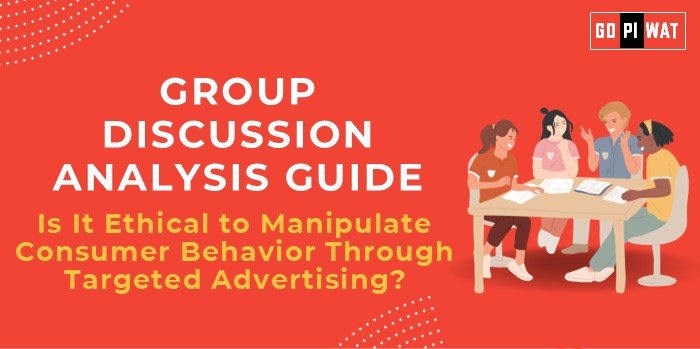📋 GD Analysis Guide: Is It Ethical to Manipulate Consumer Behavior Through Targeted Advertising?
🌐 Introduction to the Topic
Opening Context: “Targeted advertising revolutionizes modern commerce by tailoring promotions to individual preferences, yet it stirs debate about ethical boundaries and consumer autonomy.”
Topic Background: The use of AI and data analytics to target consumer behavior has grown exponentially with the digital economy. Personalized advertising often leads to better customer satisfaction and higher sales. However, concerns about privacy, manipulation, and fairness pose ethical questions about the practice.
📊 Quick Facts and Key Statistics
- Global Digital Ad Spend: $626 billion in 2023 – showcasing its significance in the economy.
- Consumer Data Collection: Over 70% of websites track user behavior – highlighting the widespread nature of tracking.
- Click-Through Rates: Targeted ads perform 2.5x better than generic ads – reflecting their effectiveness.
- Consumer Skepticism: 56% of users feel targeted ads invade their privacy (Statista, 2023).
👥 Stakeholders and Their Roles
- Advertisers: Drive sales and customer engagement through targeted campaigns.
- Tech Companies: Provide platforms and tools for precise consumer targeting.
- Governments and Regulators: Ensure ethical practices and protect consumer privacy.
- Consumers: Benefit from relevant ads but face risks of manipulation and data misuse.
🏆 Achievements and Challenges
Achievements
- Enhanced Consumer Experience: Personalized ads improve user satisfaction.
- Economic Impact: Boosts digital commerce, contributing significantly to GDP.
- Data Utilization: Enables businesses to maximize efficiency.
Challenges
- Privacy Concerns: Widespread data misuse risks breaches.
- Manipulative Practices: Promotes unhealthy consumption patterns or biases.
- Regulatory Gaps: Lack of consistent laws across regions.
Global Comparisons
- EU’s GDPR: Sets a benchmark for regulating data privacy.
- U.S.: Limited regulation, fostering innovation but raising ethical concerns.
📚 Structured Arguments for Discussion
- Supporting Stance: “Targeted advertising benefits both consumers and businesses by offering relevance and efficiency, fostering economic growth.”
- Opposing Stance: “Manipulative techniques undermine consumer autonomy and exploit vulnerabilities, eroding trust.”
- Balanced Perspective: “While targeted advertising enhances convenience, robust ethical frameworks and consumer education are crucial to mitigate its risks.”
✨ Effective Discussion Approaches
- Opening Approaches:
- Data-Driven Start: “The global ad industry spends $626 billion annually, yet over half of consumers worry about privacy.”
- Ethical Focus: “The rise of targeted ads raises the question: convenience or manipulation?”
- Counter-Argument Handling:
- Rebut privacy concerns with examples of anonymization technologies.
- Address manipulation risks by advocating transparency and regulation.
📋 Strategic Analysis of Strengths and Weaknesses
- Strengths: Improves customer satisfaction, boosts sales.
- Weaknesses: Privacy violations, trust issues.
- Opportunities: Leverage ethical AI for responsible advertising.
- Threats: Consumer backlash, regulatory crackdowns.
🏫 Connecting with B-School Applications
- Real-World Applications:
- Marketing strategies, ethical leadership, and digital transformation projects.
- Sample Interview Questions:
- “How can businesses balance profitability and ethical responsibility in targeted advertising?”
- “What regulatory frameworks could improve the transparency of digital ads?”
- Insights for B-School Students:
- Explore the role of ethics in decision-making.
- Analyze consumer behavior patterns.


